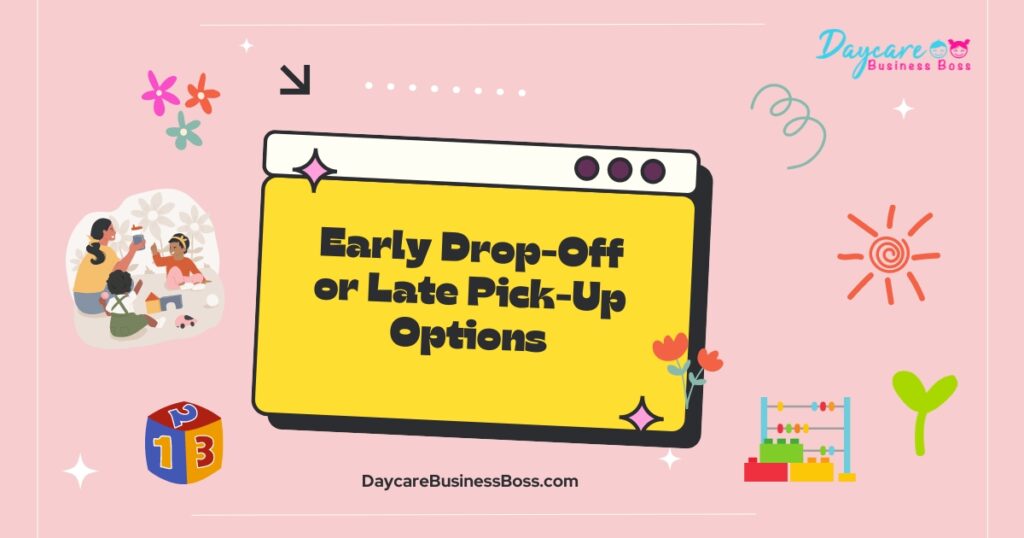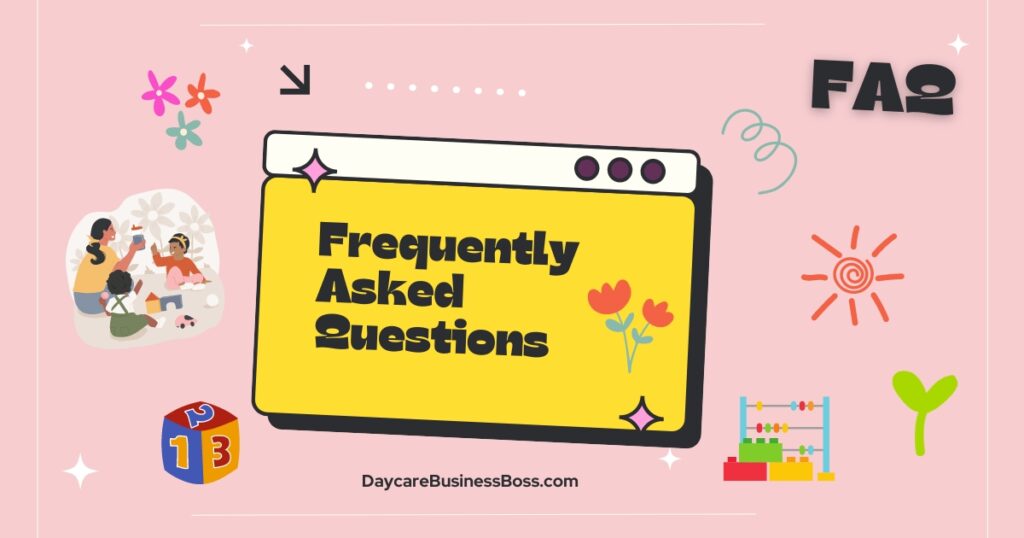A daycare business usually needs to be open early and close a bit late to serve the families in the area effectively. But, there are average hours that you’ll see more often, and you can set your open to close hours for what is best for you. Just make sure you’re balancing what’s right for you with what your community needs so your business can thrive.
When you’re deciding on your hours of operation for a new childcare business, it’s a good idea to look at the best average open to close hours for a daycare and build your schedule around those. Typically, daycares are open from 7 a.m. to 6 p.m. from Monday through Friday.
So there’s your starting point. From there, you need to look at what other needs there are for childcare hours in your area to see if there’s an opportunity for you to fill a gap in the supply chain.
Location Makes a Difference
The location of your daycare will help you to figure out what hours you need to be open. We already know that the best average open to close hours are 7 a.m to 6 p.m. during the week, but if the area around your daycare is full of businesses where people work really early, really late, or both, then you’ll probably want to think about doing some extended hours of operation to gain those families’ business.
Opening for Weekends
Some daycares will open for weekends. Let’s face it, not everyone gets to work Monday to Friday, 8-5 these days. In fact, there’s a growing trend in the workforce of people who work very irregular schedules or some kind of shift that rotates. According to The Economic Policy Institute, 17% of workers have these kinds of unstable schedules. It can make it hard for these families to find childcare when they’re at work.
You can choose to have open hours on the weekends if you want to. Most of the time, daycares that open on weekends will offer less open to close hours, but again, that’s up to you. Opening on weekends isn’t the norm either, so you may also want to charge a little more for those days.
Early Drop-Off or Late Pick-Up Options

Another thing you can do beyond the average operating hours is offer an early drop-off time and a late pick-up time. Daycares that do this usually charge a fee in addition to the normal hourly rate.
There are plenty of people who have to be at work before many others do. There are also those that don’t get off of work until well after others. These people will likely be happy to pay a little more to not have to have someone else pick up their children and keep them during the hours that daycare isn’t available. You can provide a service for them that makes their lives simpler and less stressful by opening for extended hours.
24-Hour Daycare Centers
There are some daycare centers that are open around the clock. Just as we were saying before, not everyone works the same cookie-cutter hours. The days of nice, neat “banker’s hours” are gone. There are people working at all hours of the day and night.
That means there’s a need for childcare all hours of the day and night. Daycares that are open for 24 hours will certainly have some additional guidelines to follow. There are services that they have to provide that aren’t part of a typical daycare because of the nighttime hours.
The restrictions for how many hours a child can stay in daycare per day will still have to be followed, but the purpose of a 24-hr. daycare isn’t to care for a child for all hours anyway. These daycares provide a special service for parents who work odd hours that the average daycare isn’t open for.
Drop-In Daycare
Generally, a daycare will have specific drop-off and pick-up times. But as we mentioned already, there are a lot of parents who work irregular, unpredictable schedules. They may be on-call or have shifts that rotate.
For those with irregular work schedules, it’s helpful if there are slots available in your daycare for children who need to be dropped off on an as-needed basis. You have to remember that you can only have so many children of certain ages in your care at one time, based on how many caretakers are working. You need to adhere to those guidelines at all times.
You can designate some slots for these families though. Basically, they’ll work as a first-come, first-serve kind of deal. Once those slots are full, you just can’t take any more drop-in children. This is a really helpful service in areas that have a lot of shift work or hospitals with on-call staff.
Consider Your Staff
When you’re setting your open to close hours for your daycare center, don’t forget that you have to have the staff to operate your business accordingly. Your local governments set regulations that state how many children you can have in the care of one caretaker at a time.
If you’re planning to have a daycare center that is open for a lot of hours, then you need to have the staff to facilitate that. If you’re going to offer Monday through Friday care and also offer weekend care, you can’t do that by yourself. You also can’t expect any employees to work every day either.
Remember that when you’re deciding on your hours, that decision has to be made simultaneously with your staffing decisions. You can’t be open for extended hours without the staff to sustain that. And you can’t have a large number of staff members without opening for enough hours to sustain them.
Let the Community Know What You Offer
One thing that happens to a lot of daycares is they notice they’re not getting the level of enrollment that they thought they would. Many times, this is because the families in the community aren’t aware of what the hours are that are being offered at your daycare center.
You are well aware of what open slots you have to take in more kids. However, the public does not know that if you don’t tell them. Find ways to get the word out about any extended hours you offer. Let people know that you operate on the weekends if you do. And certainly, make sure to advertise your drop-in policy if you decide to offer one.
Include the Best Average
We suggest that you definitely include the best average open to close hours for a daycare in your business plan. Beyond the average hours of 7 a.m to 6 p.m. though, you can tailor your operating times to what is needed in your community. You certainly need to consider what you and your family want too, but a business that is successful is supplying something that is in demand. That’s how it gets to that point. Do your best to meet the needs of the families you’ll be servicing so that your business has the best chance to thrive.
Related Questions

What do daycares do if you’re late to pick up your child?
Sometimes things come up when parents are on their way to pick up their child. The thing is, it’s not your responsibility to have to deal with that. You should have a policy put in place for the times that parents are late. There should be a fee for that. You can include a warning system in the policy, but don’t feel like you need to just care for someone’s child for longer for free because of things that come up. You will care for the child, but you should be compensated for that. It’s the parent’s responsibility to make arrangements for someone else to pick up the child, or they need to be charged.
How many hours are children allowed to stay in daycare?
The answer to this question varies. It depends on where the daycare is located. State governments set the standards in their local areas for how long children can be in daycare each day. The average is around 10, but in some states, children can be in a group daycare setting for up to 12 hours.
Another agency that sets regulations for how long children can be in daycare per day is an agency that offers monetary assistance to families that helps them pay for childcare services. They have contracts with the families that state how many hours they will pay for. The parents should be providing the daycare center with that information upfront. But, as a daycare center owner, you should be aware that this is the case for some families so be diligent in your efforts to make sure you have a way of requesting that information. One way to do this is through your initial paperwork for when you take on a new child.
Please note: This blog post is for educational purposes only and does not constitute legal advice. Please consult a legal expert to address your specific needs.
Find even more information about opening your own daycare business here.

Meet Shawn Chun: Entrepreneur and Childcare Business Fan.
I’m a happy individual who happens to be an entrepreneur. I have owned several types of businesses in my life from a coffee shop to an import and export business to an online review business plus a few more and now I create online daycare business resources for those interested in starting new ventures. It’s demanding work but I love it. I do it for those passionate about their business and their goals. That’s why when I meet a childcare business owner, I see myself. I know how hard the struggle is to retain clients, find good employees and keep the business growing all while trying to stay competitive.
That’s why I created Daycare Business Boss: I want to help childcare business owners like you build a thriving business that brings you endless joy and supports your ideal lifestyle.


7 thoughts on “The Best Average Operating Hours for a Daycare”
Comments are closed.